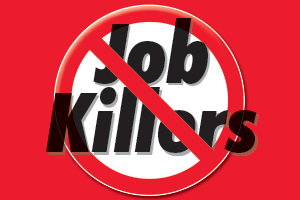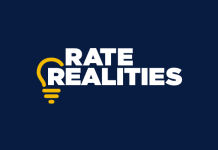 Of the 25 job killer bills the CalChamber identified this year, only three are currently moving after four job killer bills missed Friday’s deadline to move out of their house of origin.
Of the 25 job killer bills the CalChamber identified this year, only three are currently moving after four job killer bills missed Friday’s deadline to move out of their house of origin.
The remaining job killer bills would impose onerous labor and employment mandates, and increase liability for employers.
Job Killers Still Active
Labor and Employment Mandates, Workplace Safety
- AB 616 (Stone; D-Scotts Valley) Forced Unionization Process for Agricultural Employees: Limits an employee’s ability to independently and privately vote for unionization in the workplace, by essentially eliminating a secret ballot election and replacing it with the submission of representation cards signed by over 50% of the employees, which leaves employees susceptible to coercion and manipulation by labor organizations. Also, unfairly limits an employer’s ability to challenge the cards submitted by forcing employers to post an unreasonable bond, and then limits an employee’s ability to decertify a union, by forcing them to go through the ballot election process instead of submission of representation cards. Also includes an unnecessary presumption of retaliation that is effectively unlimited in scope because it would apply for the duration of an election campaign, which could last for a year or more. Scheduled for a June 7 hearing in Senate Labor, Public Employment and Retirement Committee.
- AB 701 (Gonzalez; D-San Diego) PAGA Litigation, and Regulations for Warehouses: Threatens warehouse employers with duplicative costly litigation by creating new litigation risks, including a representative action under the Private Attorneys General Act (PAGA), for failing to comply with vague standards. Also permits potential warehouse-by-warehouse setting of standards by courts via individual injunctive lawsuits, and compels duplicative and likely inconsistent regulations from both Labor Commissioner and Cal/OSHA regarding appropriate performance levels in warehouses. No hearing date set; currently in Senate Rules Committee.
- SB 62 (Durazo; D-Los Angeles) Increased Costs and Liability on Employers: Significantly increases the burden on non-unionized employers in the garment manufacturing industry in California, by eliminating piece rate as a method of payment even though it can benefit the employee, creating joint and several liability for contractors for any wage violations or the employer, and shifting the evidentiary standards in a Labor Commissioner hearing to limit the ability for an employer to defend against an alleged wage violation. These additional requirements will encourage companies to contract with manufacturers outside of California, thereby limiting the demand and workforce of garment manufacturers in California. Scheduled for a June 8 hearing in Assembly Labor and Employment Committee.
Bills Stalled
The following bills failed to meet the house of origin deadline on June 4:
- AB 650 (Muratsuchi; D-Torrance) Healthcare Workers: COVID-19 Bonuses: Imposes at least an estimated $7 billion in direct payroll costs on healthcare providers through mandatory bonuses, which will jeopardize access to affordable healthcare due to the billions of dollars the healthcare industry has lost during the pandemic. Prohibits healthcare providers from reducing staff even if they are unable to afford to continue to pay those bonuses. Placed on Assembly Inactive File on June 3 at author’s request.
- AB 995 (Gonzalez; D-San Diego) Costly Sick Leave Expansion on All Employers: Imposes new costs and leave requirements on employers of all sizes, by expanding the number of paid sick days employers are required to provide, which is in addition to all of the recently enacted leave mandates (COVID-19 sick leave, CalOSHA emergency paid time off, California Family Rights Act (CFRA) leave, workers’ compensation, etc.) that small employers throughout the state are already struggling with to implement and comply. Placed on Assembly Inactive File on June 3 at author’s request.
- AB 1192 (Kalra; D-San Jose) Public Shaming of Employers: Places new onerous administrative burdens on employers by requiring annual reporting of wage and hour data and employee benefits for an employer’s entire United States workforce that will publicly shame employers for lawful conduct by publishing that data on the Labor and Workforce Development Agency’s website, and will subject employers to frivolous litigation and settlement demands. Placed on Assembly Inactive File on June 3 at author’s request.
- SB 213 (Cortese; D-San Jose) Expands Costly Presumption of Injury: Significantly increases workers’ compensation costs for public and private hospitals by presuming certain diseases and injuries are caused by the workplace and establishes an extremely concerning precedent for expanding presumptions into the private sector. Placed on Senate Inactive File on June 3 after falling short of votes needed to pass.
Tax Increases
The following tax-related bills are likely dead for the year, although they may be brought up at any time as tax increases are not subject to normal legislative deadlines.
- ACA 8 (Lee; D-San Jose) Wealth Tax: Proposes to amend the Constitution to impose a massive tax increase upon all forms of personal property or wealth, whether tangible or intangible, despite California already having the highest income tax in the country. This tax increase will drive high-income earners out of the State as well as the revenue they contribute to the General Fund. No policy hearing date set, but may move at any time as tax increases are not subject to normal legislative deadlines.
- AB 71 (L. Rivas; D-Arleta) Massive Corporate Tax Increase: Significantly increases the taxation on the gross income of American companies with an international presence to create a homelessness fund, thereby shifting the responsibility of the crisis onto the private sector, despite the state’s $76 billion (as indicated by the Governor) in unexpected revenue. Placed on Assembly Inactive File on June 3 at author’s request.
- AB 310 (Lee; D-San Jose) Wealth Tax: Seeks to impose a massive tax increase upon all forms of personal property or wealth, whether tangible or intangible, despite California already having the highest income tax in the country. This tax increase will drive high-income earners out of the State as well as the revenue they contribute to the General Fund. No policy hearing date set, but may move at any time as tax increases are not subject to normal legislative deadlines.
- AB 1199 (Gipson; D-Carson) Targeted Tax on Homeowners: Unfairly imposes an excise tax on certain individual and corporate homeowners to pay for housing related services, which will ultimately increase rental rates and worsen housing unaffordability for vulnerable tenants. No policy hearing date set, but may move at any time as tax increases are not subject to normal legislative deadlines.
- AB 1253 (Santiago; D-Los Angeles) Massive Personal Income Tax Increase: Increases the state personal income tax rate, which is already the highest in the country, on high wage earners and sole proprietors. This tax increase will drive high-income earners out of the State as well as the revenue they contribute to the General Fund. No policy hearing date set, but may move at any time as tax increases are not subject to normal legislative deadlines.


